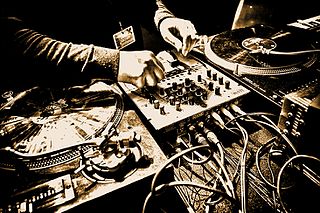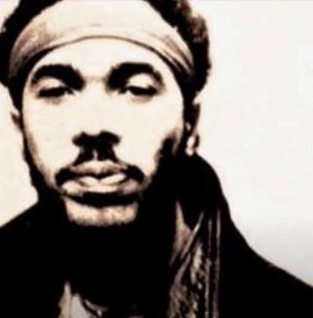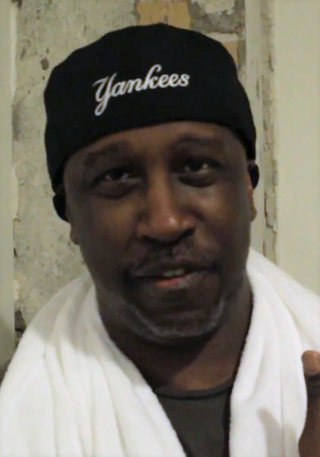Related Research Articles
House is a genre of electronic dance music characterized by a repetitive four-on-the-floor beat and a typical tempo of 115–130 beats per minute. It was created by DJs and music producers from Chicago's Black gay underground club culture and evolved slowly in the early/mid 1980s as DJs began altering disco songs to give them a more mechanical beat. By early 1988, House became mainstream and supplanted the typical 80s music beat.

The Roland TB-303 Bass Line is a bass synthesizer released by Roland Corporation in 1981. Designed to simulate bass guitars, it was a commercial failure and was discontinued in 1984. However, cheap second-hand units were adopted by electronic musicians, and its "squelching" or "chirping" sound became a foundation of electronic dance music genres such as acid house, Chicago house and techno. It has inspired numerous clones.
Chicago house refers to house music produced during the mid to late 1980s within Chicago. The term is generally used to refer to the original house music DJs and producers from the area, such as Ron Hardy and Phuture.

Deep house is a subgenre of house music that originated in the 1980s, initially fusing elements of Chicago house with the lush chords of 1980s jazz-funk and touches of soul music. Its origins are attributed to the early recordings of Larry Heard, including his influential track "Can You Feel It".

Ron Hardy was an American, Chicago, Illinois-based DJ and record producer of early house music. He is well known for playing records at the Muzic Box, a Chicago house music club. Decades after his death, he is recognized for his innovative edits and mixes of disco, soul music, funk and early house music.
An acid house party was a type of illegal party typically staged in abandoned warehouses between 1987 and 1989. Parties played acid house and acid techno music, electronic music genres with a distinct sound from the use of the Roland TB-303 synthesizer. The origin of the term acid house party is disputed coming either from the 1987 song "Acid Tracks" by Phuture, or the consumption of MDMA and LSD that were common at the parties.
Acid techno, sometimes known generally as "acid", is a genre of techno that was derived from acid house and developed in Europe in the late 1980s to early 1990s. It saw younger artists apply the "squelching" synthesizer sound of Chicago acid house to harder-edged techno material.

Todd Norton Terry is an American DJ, record producer and remixer in the genre of house music. His productions helped define the New York house scene in the 1990s and used extensive samples that blend the sounds of classic disco, the Chicago house sound, and elements of hip-hop. He has remixed a wide variety of artists.
Larry Heard is an American DJ, record producer, and musician who has recorded under various names, most notably Mr. Fingers. He is widely known as a pioneering figure in 1980s house music, and was leader of the influential group Fingers Inc., whose 1988 album Another Side was the first long-form house LP. He is regarded as a progenitor of the deep house subgenre, bridging the gap between the futurism of house and the lush sound of disco. His landmark 1986 single "Can You Feel It" would be a major influence on dance music.

Trax Records is an American independent record label based in Chicago, Illinois, United States. It played a major part in the development of house music.

"Acid Tracks" is a 1987 acid house song by Phuture produced by Marshall Jefferson and released by Trax Records. Phuture consisted of Nathan Pierre Jones, better known as DJ Pierre, Earl Smith Jr, and Herbert Jackson. Jones had been interested in developing dance music and became superficially interested in house music after Spanky had taken him to see DJ Ron Hardy perform in Chicago. The trio began developing tracks without finding anything that they felt was satisfying; Jones had heard a track made on the unpopular Roland TB-303 bass machine, which led the group to purchase one.
Phuture 303 was an acid house music group founded in 1996 by DJ Spank Spank. Its members included Roy Davis Jr., Damon Neloms, L.A. Williams, Ron Maney a.k.a. DJ Skull and Rio "The Musician" Lee.

Nathaniel Pierre Jones, better known by his stage name DJ Pierre, is an American DJ and performer of house music based in Chicago.

Jesse Saunders is an American house music artist, DJ, record producer, film producer, and entrepreneur. His 1984 single, "On & On", co-written with Vince Lawrence, was the first house record to be pressed and sold to the public. Since his emergence as a DJ, Saunders has run several independent labels and worked extensively in music and film production, as well as artist promotion and management. He is also a long-time member of the National Academy of Recording Arts and Sciences.

"This Is Acid", also known by its full title, "This Is Acid (A New Dance Craze)", is a song by Chicago house music DJ and producer Maurice Joshua, who recorded the track under his first name "Maurice". It reached number one on the Billboard Hot Dance Club Play chart in April 1989 and stayed there for two weeks.

Acid house is a subgenre of house music developed around the mid-1980s by DJs from Chicago. The style is defined primarily by the squelching sounds and basslines of the Roland TB-303 electronic bass synthesizer-sequencer, an innovation attributed to Chicago artists Phuture and Sleezy D circa 1986.
Charanjit Singh was an Indian musician from Mumbai, who performed as a session musician, often as a guitarist or synthesizer player, in numerous Bollywood soundtrack orchestras from the 1960s to 1980s, working with filmi composers such as Shankar-Jaikishan, R.D. Burman, S.D. Burman, and Laxmikant–Pyarelal.
Earl Smith Jr., known as DJ Spank Spank or Spanky, was an American musician credited with inspiring the acid house music genre. He founded the group Phuture.
Derrick Harris was a Chicago music producer and one of the pioneers of house music and acid house. He is known for the song "I've Lost Control", which was released as a 12" single on the Trax Records label, issue number TX 113. The song used a Roland TR-808 and a Roland TB-303 bass synthesizer to create the signature modulated waveform sound which would directly inspire acid house. The track is arguably the first to use this particular sound, and rose to cult underground popularity thanks to DJ Ron Hardy's Music Box club in Chicago.

Acid: Can You Jack? is a 2005 compilation album released by Soul Jazz Records. The album compiles acid house music from the Chicago era from labels such as Trax and DJ International.
References
- 1 2 3 Poe, Jim. "Phuture: pioneers of acid house". The Guardian. Retrieved 6 September 2018.
- ↑ Shapiro, Peter (2000). Modulations: A History of Electronic Music. Caipirinha Productions Inc. p. 32. ISBN 978-0-8195-6498-6.
- ↑ Interview with Phuture's DJ Pierre in DJ mag, 2014.
- ↑ Review by Alain_Patrick on Discogs; Interview with DJ Pierre in Fader Magazine, August 04, 2014.
- 1 2 Source: Discogs discography and biography